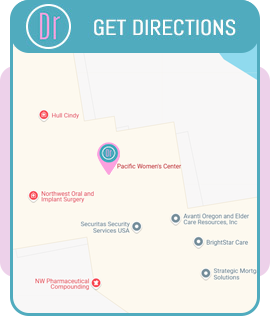Vaginal Disease Treatment Specialist in Eugene, OR
Vaginal diseases can cause a variety of symptoms, including irregular bleeding, itching, burning discomfort during sex, and unexpected vaginal discharge. These signs could point to bacterial or yeast infections, among other illnesses. While experiencing these symptoms, consult Dr. Richard A. Beyerlein, MD, CPI, FACOG, and Tamara A. Stenshoel, MD, FACOG. We efficiently detect and treat vaginal disorders and offer preventive treatment to stop reoccurring infections. Visit us today at Pacific Women’s Center. For more information, contact us or schedule an appointment online. We are conveniently located at 911 Country Club Rd. Suite 222, Eugene, OR 97401.
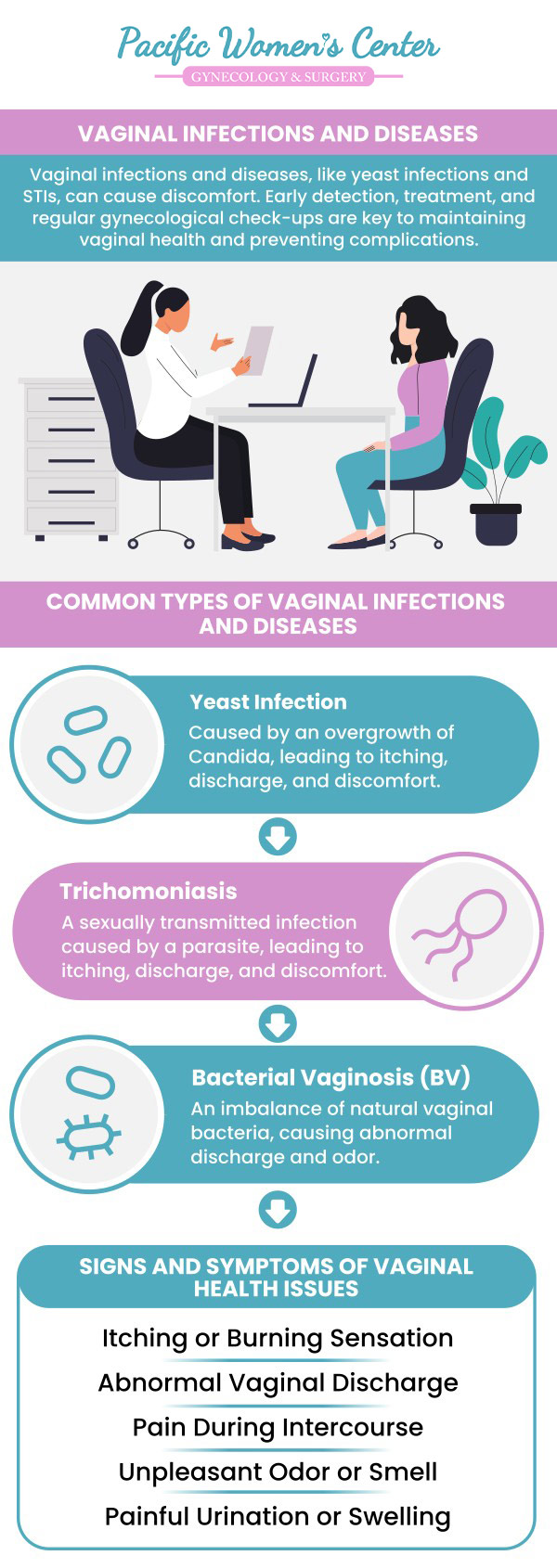
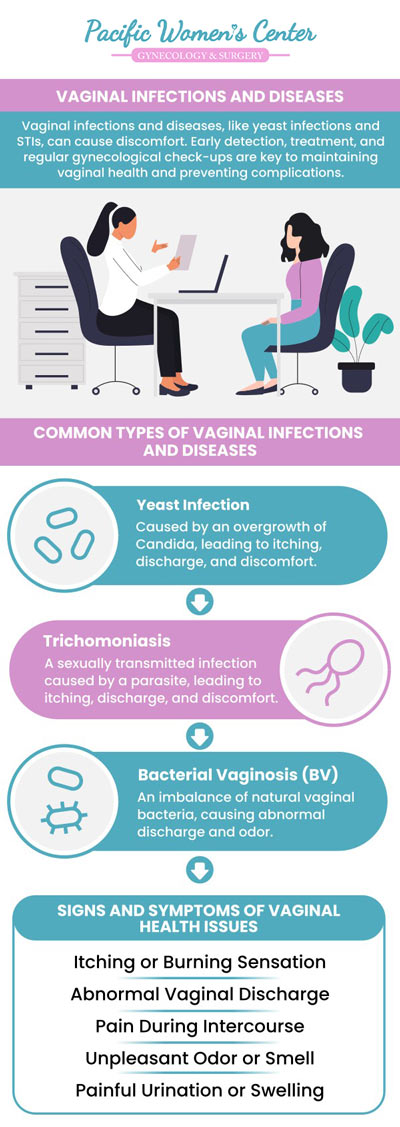
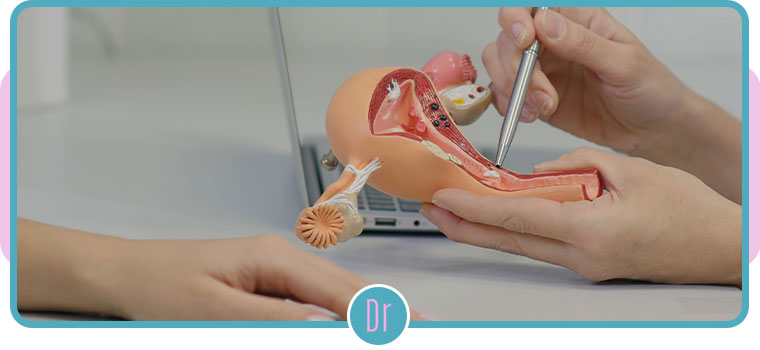
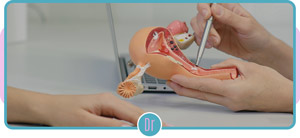
Table of Contents:
What is the function of the vagina?
What are some common types of vaginal infections?
What are the symptoms of vaginal diseases?
What are the causes of vaginal infections in teens?
Your reproductive system is an important part of your health and well-being. The vagina, in particular, plays an essential role in sexual pleasure, reproduction, and overall health.
The vagina is a muscular canal that connects the external genitalia, known as the vulva, to the cervix of the uterus. One of its primary functions is to facilitate sexual intercourse. During sexual arousal, the vagina naturally lubricates itself to make penetration more comfortable and enjoyable. However, vaginal dryness can make sex uncomfortable and even painful.
The vagina not only provides sexual pleasure but is also vital to reproductive health. It allows sperm to reach the egg, often resulting in fertilization and pregnancy. The vagina, which is the channel through which the baby is delivered, is also very important in labor. Vaginal health has a strong impact on overall health and wellness.
For women of all ages, vaginal infections are a common issue. Infections can lead to a variety of unpleasant symptoms, including itchiness, burning, discharge, and pain while having sex. Vaginal infections come in many forms, including:
● Yeast infections – Yeast, a type of fungus that is naturally found in the vagina, overgrows and leads to yeast infections. Several factors, including antibiotic use, pregnancy, and hormonal changes, can contribute to an increase in yeast.
● Bacterial vaginosis – This type of infection is brought on by an overabundance of bacteria in the vagina. A fishy smell and grayish-white discharge are common symptoms.
● Chlamydia – In the United States, chlamydia is one of the most common STIs. Atypical vaginal discharge, urination that burns, and pain during sex are a few symptoms of chlamydia.
● Gonorrhea – This is a bacterial infection that is transmitted through sexual activity. The United States has a high prevalence of this sexually transmitted infection.
● Trichomoniasis – Trichomoniasis is a parasite-borne STI. Itching, burning, and a greenish-yellow discharge are symptoms of trichomoniasis.
Vaginal diseases are common and can cause a range of uncomfortable symptoms. The most common symptoms of vaginal diseases include:
● Abnormal discharge – Abnormal vaginal discharge is a common sign of vaginal disease. The discharge can have an odd color or smell, or it could be thicker or thinner.
● Vaginal itching or burning – Redness or swelling may accompany the itching or burning sensation, which can range in intensity from mild to severe.
● Pain or discomfort – Vaginal illnesses can cause pain or discomfort in the pelvic area during sex. Swelling or redness may also be present, and the discomfort is described as moderate to severe.
● Bleeding – Vaginal diseases can cause bleeding between periods, after sex, or during menopause.
● Urinary symptoms – Certain vaginal disorders can result in symptoms such as frequent urination, urinary incontinence, or pain or burning while urinating.
● Skin symptoms – Some vaginal diseases can cause symptoms such as rashes or blisters.
Vaginal infections affect teens just as they affect women of any age. Some of the common causes of vaginal infections in teens include:
● Hormones – Teenagers go through considerable hormonal changes during puberty, which have an impact on the pH balance of the vagina. Infections of the vagina can result from an excess of bacteria or yeast as a result of this.
● Sexually transmitted infections (STIs) – Teens who engage in sexual activity run the risk of contracting STIs, which can lead to vaginal infections. The risk is greater when they have oral, vaginal, or anal intercourse without using protection.
● Tight clothes – Clothes can trap moisture and produce a warm, wet environment that promotes the growth of bacteria or yeast. Clothing such as slim jeans and leggings can cause vaginal infections.
● Harsh soaps or feminine hygiene items – Using harsh soaps or feminine hygiene items can alter the pH balance of the vagina, which can result in vaginal infections.
● Poor hygiene – Vaginal infections become more common when proper personal hygiene is not practiced, such as failing to wash often or not changing underwear frequently.
● Antibiotics – Antibiotics have the potential to upset the normal bacterial balance in the vagina, causing an overgrowth of bacteria or yeast.
Early detection and treatment of vaginal conditions can slow the disease’s progression, alleviate symptoms, and lower the risk of consequences such as pelvic inflammatory disease in pregnancy and preterm birth. A variety of therapy options may be available if you seek care from a gynecologist. Women can address any vaginal health issues and make sure their reproductive health is at its best by consulting with a gynecologist. For more information, contact us today or schedule an appointment online. We are conveniently located at 911 Country Club Rd. Suite 222, Eugene, OR 97401. We serve patients from Eugene OR, Springfield OR, Coburg OR, Creswell OR, Cottage Grove OR, Lowell OR, Junction City OR, and surrounding areas.

ADDITIONAL SERVICES YOU MAY NEED
❱ Abdominal Hysterectomy
❱ Bladder Lift Surgeon Q&A
❱ Cervical Cone Biopsy
❱ Colposcopy
❱ Endometrial Ablation
❱ Endometrial Biopsy
❱ Female Sexual Dysfunction
❱ Gynecological Surgery
❱ Gynecology
❱ Hormone Therapy
❱ Vaginal Hysterectomy
❱ Endometriosis Diagnosis & Care


